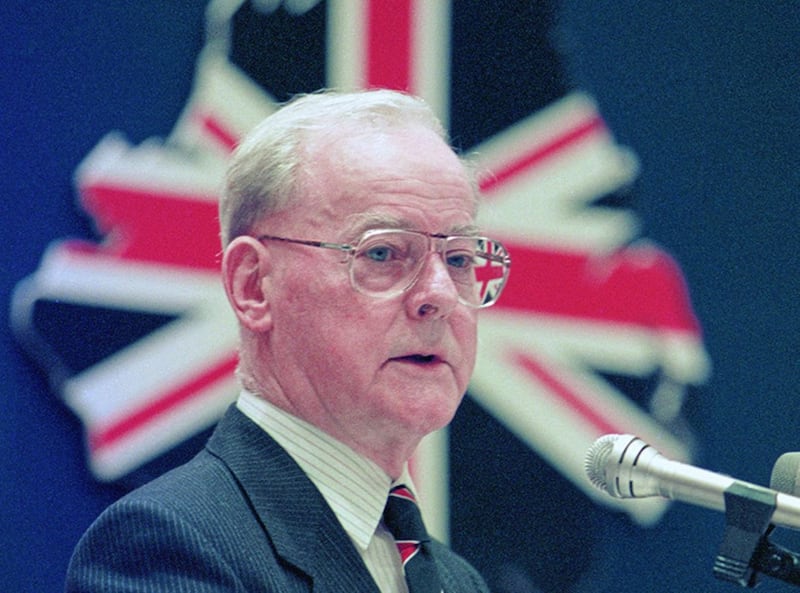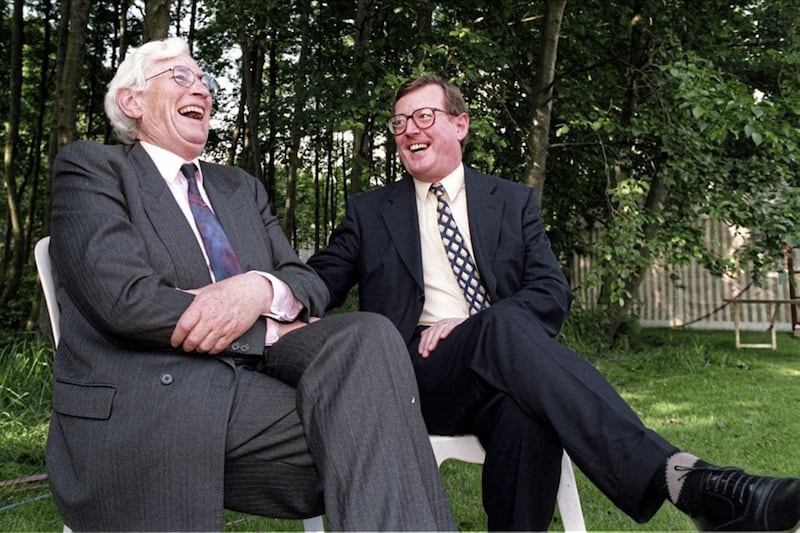When Terence O’Neill was appointed UUP leader and prime minister in March 1963 it actually looked like the possible beginning of a new era for unionism in Northern Ireland. The IRA’s 1956-62 campaign had collapsed in utter failure. O’Neill reached out to non-unionists by choice rather than under any specific external pressure. He met Taoiseach Seán Lemass in both Dublin and at Stormont. He visited a convent. He spoke about the need for political and societal reconciliation and viewed economic progress as a key vehicle for that change. He proscribed the revitalised UVF in June 1966.
But that possible new-era unionism was crushed by a combination of factors which spooked some of his own MPs and key players across the Ulster Unionist Party (not least the emergence of the NI Civil Rights Association) and forced him into what became known as the ‘Crossroads’ election in February 1969. That election also saw the first elements of an electoral disintegration of the party, because pro and anti-O’Neill candidates were selected (and subsequently elected) by constituency associations: and while O’Neill’s supporters had a numerical majority he was left in such a weak position that he had to resign a few weeks later.
His successor, James Chichester-Clark, inherited a position as weak as O’Neill’s, beating Brian Faulker to the leadership (and role of PM) by just 17-16 votes. It was always going to be impossible for him to unite the party. He was being challenged by the rise of the DUP to his right and Alliance to his centre left; new paramilitary groups were emerging in republicanism and loyalism; there were outbreaks of civil disturbances; the Hunt Report recommended disbanding the RUC; and the 1969 Downing Street Declaration insisted that “every citizen of NI is entitled to the same equality of treatment and freedom of discrimination as obtains in the rest of the UK, irrespective of political views or religion”.
All of this was too much for a growing number of his own supporters. It was also too much for him. His health deteriorated under the pressure, and he resigned in March 1971. He was succeeded by Brian Faulkner, who saw off a challenge from the more extreme William Craig by a very comfortable 26-4 votes. Within a matter of months Craig would lay the foundations for the founding of what would become the Vanguard Party.

Meanwhile, Faulkner was coming under even more pressure than O’Neill and Chichester-Clark, a pressure that ended in the prorogation of the NI Parliament in March 1972. If his two immediate predecessors are best remembered as the UUP leaders who had to face the challenges of the Civil Rights Movement and a new hands-on approach from Westminster, Faulkner is best remembered as the leader who had to try and find a new role for the UUP after 50 years of political/electoral dominance.
In fairness to him, he rose to that challenge better than Craig or any other senior UUP figure would have done. It tends to be forgotten now that he persuaded the Ulster Unionist Council, under huge internal and external pressures, to endorse the 1973 White Paper which included the end of one-party government, power-sharing with the SDLP, and the concept of an ‘Irish dimension’. He pushed his party too far, too early on a Council of Ireland and resigned as party leader in January 1974, after a policy defeat at a meeting of the UUC.
The jury is still out on whether the electoral/political damage David Trimble inflicted on the UUP was worth it; but it was certainly a scale of damage which his six successors — with a seventh just about to be elected — have failed to either fully address, let alone reverse
His successor, Harry West (who would never have become leader under what might be described as ‘normal’ circumstances), spent most of his time in the role trying to prevent the UUP splitting even more than it had done under Faulkner. But his strategy involved building anti-Sunningdale links with the DUP and Vanguard (along with elements of fringe unionism and loyalist paramilitaries) in the United Ulster Unionist Council; links which were to last until 1977. What finally did for him was the 1979 Euro election, when Ian Paisley’s vote — 29.8% — was greater than the UUP’s 18.7% (West and John Taylor were the candidates) and Jim Kilfedder’s 5.9% (he stood as an ‘Ulster Unionist’) combined.

His successor was Jim Molyneaux, who remained in the role until 1995. His priority was to rebuild the UUP as a standalone party again and, in so doing, kill off the rise of the DUP on the back of Paisley’s personal popularity. His tenure was summed up by one observer as little more than an exercise in “masterly inactivity”. Clearly harsh, but not entirely inaccurate. Everything that happened — and that included the Anglo-Irish Agreement, the 1993 Downing Street Declaration and the 1995 Framework Documents — always seemed to come as a surprise to him. Yes, he kept the UUP’s nose ahead of the DUP and other electoral challenges, but he was also taken up too many garden paths by Margaret Thatcher and John Major.
David Trimble, in a result which surprised many and disturbed the UK and Irish governments, succeeded Molyneaux in September 1995. The era of masterly inactivity was replaced by what might be described as a whirlwind version of Faulkner. The jury is still out on whether the electoral/political damage he inflicted on the UUP was worth it; but it was certainly a scale of damage which his six successors — with a seventh just about to be elected — have failed to either fully address, let alone reverse.

What Reg Empey, Tom Elliott, Mike Nesbitt, Robin Swann, Steve Aiken and Doug Beattie have tried to do is design a political/electoral version of the UUP which somehow appeals at a time when unionism generally has a whole array of post-Trimble, post-Brexit challenges and while demographics are continuing to shift. For a brief moment it looked as though Nesbitt had cracked it, with gains at the 2014 council elections and two MPs at the 2015 general election. But after an unexpectedly bad 2017 assembly election he threw in the towel.
He’s going to have another go now. But one thing is certain: he faces huge and numerous hurdles to clear between now and the next election, probably in 2027. The biggest enemy Nesbitt, who looks likely to be unopposed, faces — as has been the case since O’Neill in 1969 — will be his own party. I sometimes think the UUP has never got over losing its 50-year hold on political/electoral dominance in 1972. Bewilderingly, it still seems to blame its own leadership for that collapse: which may explain why it continues to blame each leader in turn for everything else that has happened.








